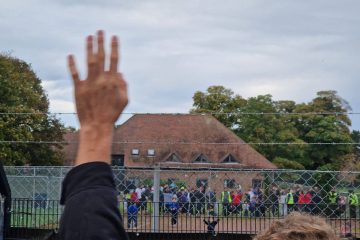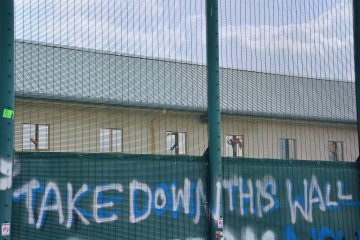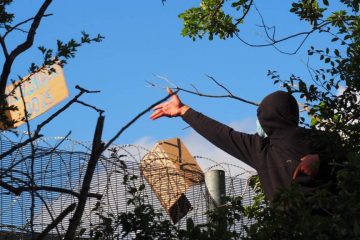“A Living Nightmare”: Sonita Gale’s “Hostile”

For some, the recent despicable treatment of Ukrainian refugees by the Home Office was a shocking phenomenon. It was inconceivable that the UK immigration system could be so unhospitable. For others, it was only one of many manifestations of how cruel the border system already is, largely in part due to the continued growth of the border industrial complex and the Hostile Environment which enables it.
Sonita Gale’s 2022 documentary Hostile presents an extremely sobering journey through the UK Government’s ‘Hostile Environment’ policy strategy and the impacts it has on daily life for immigrant communities. This strategy of slow and structural violence, for those who may not already know, was originally articulated in 2012 by former Home Secretary Theresa May, with the aim of creating living conditions so inhospitable that undocumented people would face no choice but to leave the UK. Given the insidious and far-reaching nature of the Hostile Environment and its ability to infiltrate and seep into every part of daily life in Britain, it is only fitting that the documentary covers such a wide range of experiences and topics.
Like the various layers of the Hostile Environment’s structural violence, Gale’s debut film leaves no soul and no story untouched. One of the most distressing accounts is that of Daksha Varsani and Paresh Jethwa’s Brent-based and immigrant-led Community Response Kitchen, which provided hundreds of thousands of hot meals for those with No Recourse to Public Funds, frontline NHS workers, and others on the poverty line. Almost 1.4 million people with migrant status in the UK are estimated to be affected by the No Recourse to Public Funds condition, which essentially prevents them from accessing essential public services such as Housing Benefits, Child Benefits, Universal Credit, and much more.
Many international university students and school-aged pupils had been – and are continuing to be – made destitute as a result of both the pandemic and the Hostile Environment’s policies, with no access to public services, free school meals or other forms of support because of their immigration status. Where the government had failed to provide the most basic service, Daksha and Paresh’s community kitchen had stepped in. But with little to no help from the council or central government in funding their activities or securing a permanent space for their kitchen, they were forced to close their doors.
And then there is the story of NHS IT Engineer Farrukh Sair, which begins with a daunting shot of him sat at a kitchen table, surrounded by stacks upon stacks of immigration application documents. A familiar sight, no doubt, for many who have had to come up against the UK’s immigration system. Despite having lived in the UK for over 15 years, Farrukh fights an incessant battle with the impenetrable and inaccessible fortress of bureaucracy which mans the frontlines of the UK government’s immigration system and ultimately decides who ‘gets to stay’ and who doesn’t. The sheer volume and specificity of documentation expected from immigrant communities and lack of transparency around the processes that justify their right to live in the UK threatens to bury them alive in admin.
Finally, it is through the lived experience of Anthony Bryan that Gale’s documentary exposes the pivotal role that the Hostile Environment has had on mistreatment of members of the Windrush generation. Anthony had received a letter from the Home Office claiming that he no longer had the right to live in the UK, like many other Windrush Scandal survivors who quickly discovered that under the Hostile Environment. Although they had spent their entire lives in Britain, they were now considered as undocumented under this immigration policy strategy and thereby threatened with deportation.
Gale’s film lays bare the rotten nature of the immigration system in this country: it is a truly Kafkaesque living nightmare. It is deliberately complex, everchanging, and impossible to navigate by design for the purpose of driving people to the margins, before forcing you to finally succumb to destitution or hopelessness. With the Hostile Environment, it is not your actions which make you illegal, it’s a game of pure chance and completely dependent on bureaucratic fine lines and what the legal infrastructure surrounding you looks like on that given day.
Although Gale’s documentary makes a striking effort at exposing the Hostile Environment’s multi-faceted impact on the lives of immigrants, it is interesting that time and time again during the film there are references to the fact that immigrants deserve support because they are “hardworking” and “law-abiding” people. How can we fetishise the law and someone’s capacity to contribute to the economy, after observing how the law itself serves insidious purposes and is often arbitrary rather than grounded in logic? This narrative of “the good immigrant”, well-intentioned as it may be, further isolates those in immigrant communities who are on the margins of the margins. How can we ensure our immigration advocacy prioritises everyone’s liberation – regardless of their ‘physical or mental abilities’, regardless of the potential criminalisation of their addictions or line of work, regardless of their neurodivergence?
“Gale’s film lays bare the rotten nature of the immigration system in this country: it is a truly Kafkaesque living nightmare.”
A question emerges from Zana Khan, one of the interviewees during the documentary: “At what point did things change? This is an inclusive, not exclusive country.” Perhaps one of the reasons why a turning point is so difficult to locate is because there isn’t one. Has Britain ever been a truly inclusive country if not for the sake of its own convenience and pragmatism? The documentary itself dives into a brief history Britain’s immigration policies and its continued reliance on exclusive notions of citizenship and race for the maintenance of power and wealth, dating back to the times of colonialism. It also provides a useful exploration of how the law and politics have been crucial to this slow war waged on immigrant communities, and how the accumulation of bad legislation on top of bad legislation has brought us to the Hostile Environment, which is by no means a promised end point or ‘the worst that it can get.’ The Home Office’s agenda of expanding the net of criminalisation will only continue to advance, we have already seen this with the recent introduction of the Police, Crime, Sentencing and Courts Bill. In the face of this expansion, our movement for the abolition of immigration detention will have to continue to expand its vision and its networks with other movements, and documentaries like Hostile will play a fundamental role in speaking truth to power.
I.K. is an organiser with SOAS Detainee Support. Learn more about this documentary at: https://www.hostiledocumentary.com/



0 Comments